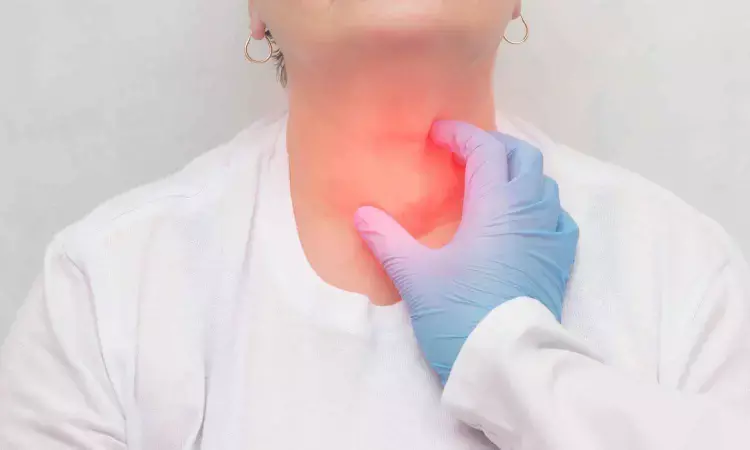- Home
- Medical news & Guidelines
- Anesthesiology
- Cardiology and CTVS
- Critical Care
- Dentistry
- Dermatology
- Diabetes and Endocrinology
- ENT
- Gastroenterology
- Medicine
- Nephrology
- Neurology
- Obstretics-Gynaecology
- Oncology
- Ophthalmology
- Orthopaedics
- Pediatrics-Neonatology
- Psychiatry
- Pulmonology
- Radiology
- Surgery
- Urology
- Laboratory Medicine
- Diet
- Nursing
- Paramedical
- Physiotherapy
- Health news
- Fact Check
- Bone Health Fact Check
- Brain Health Fact Check
- Cancer Related Fact Check
- Child Care Fact Check
- Dental and oral health fact check
- Diabetes and metabolic health fact check
- Diet and Nutrition Fact Check
- Eye and ENT Care Fact Check
- Fitness fact check
- Gut health fact check
- Heart health fact check
- Kidney health fact check
- Medical education fact check
- Men's health fact check
- Respiratory fact check
- Skin and hair care fact check
- Vaccine and Immunization fact check
- Women's health fact check
- AYUSH
- State News
- Andaman and Nicobar Islands
- Andhra Pradesh
- Arunachal Pradesh
- Assam
- Bihar
- Chandigarh
- Chattisgarh
- Dadra and Nagar Haveli
- Daman and Diu
- Delhi
- Goa
- Gujarat
- Haryana
- Himachal Pradesh
- Jammu & Kashmir
- Jharkhand
- Karnataka
- Kerala
- Ladakh
- Lakshadweep
- Madhya Pradesh
- Maharashtra
- Manipur
- Meghalaya
- Mizoram
- Nagaland
- Odisha
- Puducherry
- Punjab
- Rajasthan
- Sikkim
- Tamil Nadu
- Telangana
- Tripura
- Uttar Pradesh
- Uttrakhand
- West Bengal
- Medical Education
- Industry
Higher Dental Radiation Doses Tied to Increased Risk of Cavities in Head and Neck Cancer Patients: Study Finds

Ireland: A recent clinical investigation published in the Journal of Dentistry has revealed a significant link between dental radiation exposure and the development of tooth decay in patients undergoing radiotherapy for head and neck cancer (HANC). The study highlights the importance of dental care and dietary compliance before and after radiotherapy in reducing the risk of radiation-related oral complications.
The study emphasized that patients who did not adhere to oral hygiene and dietary recommendations were more likely to experience increased severity of tooth decay following treatment.
Conducted as a prospective cohort study, Ciaran Moore, Department of Restorative Dentistry and Periodontology, Dublin Dental University Hospital, Lincoln Place, Dublin, Ireland, and colleagues followed 151 patients who were deemed dentally fit before the start of their radiotherapy treatment. These individuals were monitored for 6 to 12 months post-treatment, during which their oral health was assessed using clinical evaluations and standardized questionnaires. Particular attention was given to the condition of teeth, the presence of xerostomia (dry mouth), and patients' oral health-related quality of life.
The study revealed the following findings:
- There was a clear linear relationship between dental radiation dose and the development of cavities.
- Around 49% of patients developed new carious lesions during the follow-up period.
- Affected individuals had an average of 3.7 decayed teeth each.
- Every 10 Gray (Gy) increase in mean or maximum dental radiation dose raised the risk of developing post-radiotherapy caries by 26–32%, even after accounting for other variables.
- Radiation to the parotid glands showed no impact on the incidence or severity of dental caries.
- The localized effect of radiation appears to target the teeth directly rather than acting through reduced saliva production.
- Higher caries risk was associated with the presence of pre-existing dental decay.
- Continued intake of high-sugar dietary supplements contributed to an increased risk of caries.
- Regular consumption of sugary beverages, such as tea or coffee with added sugar, also elevates the likelihood of dental decay.
The authors stress the clinical importance of these findings, noting that targeted radiation planning and strict oral care protocols could play a pivotal role in reducing dental complications for HANC patients. While radiation therapy is an essential component in treating head and neck cancers, its impact on dental health should not be overlooked.
The study provides crucial evidence supporting the need for multidisciplinary management of cancer patients, where dental professionals work closely with oncologists to mitigate preventable side effects of radiation therapy. Future research is encouraged to further explore protective interventions and refine radiotherapy techniques to minimize damage to dental structures.
Reference:
Moore, C., Markey, N., Donnelly, M., O’Neill, C., Cardwell, C., & McKenna, G. (2025). A prospective clinical study of the influence of dental and salivary gland radiation dose on dental caries development in patients with head and neck cancer. Journal of Dentistry, 105817. https://doi.org/10.1016/j.jdent.2025.105817
Dr Kamal Kant Kohli-MBBS, DTCD- a chest specialist with more than 30 years of practice and a flair for writing clinical articles, Dr Kamal Kant Kohli joined Medical Dialogues as a Chief Editor of Medical News. Besides writing articles, as an editor, he proofreads and verifies all the medical content published on Medical Dialogues including those coming from journals, studies,medical conferences,guidelines etc. Email: drkohli@medicaldialogues.in. Contact no. 011-43720751


